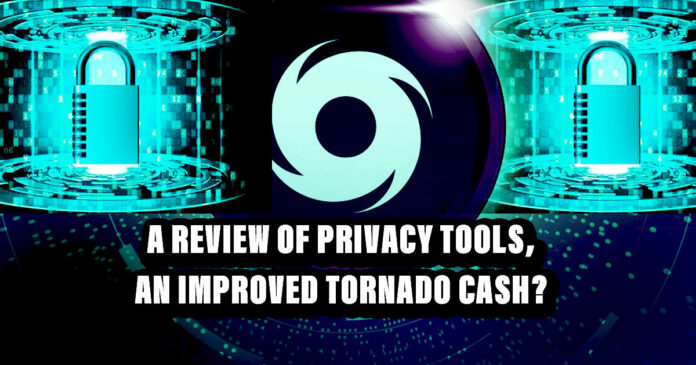This privacy paper is basically covering the app, or I guess the concept of the app, that Amin came up with called ‘privacy pools’ earlier this year in March.
Let’s discover how Privacy Tools works.
What is Privacy Pools?
Privacy Pools is a project aimed to “fix” the popular open-source solution for anonymizing Ethereum transactions in order to make it regulator-friendly. It’s basically the concept of making Tornado Cash or at least forking Tornado Cash, and making it regulatory-compliant.
This clip gives a good idea of what @VitalikButerin is thinking with Privacy Pools.
He thinks that "guilt" & "innocence" are antiquated terms.
According to Vitalik, there should be no expectation of being treated as "innocent until proven guilty" when using Ethereum. pic.twitter.com/XNK7mfsy3F
— Chris Blec (@ChrisBlec) September 19, 2023
The way they do this is by splitting the pools into isolated pools, where you can prove to a regulator that your funds didn’t co-mingle with bad actor funds while still preserving your privacy. This idea is interesting in theory, but it will be interesting to see how it plays out in practice. There are some concerns, such as normalizing censorship and financial surveillance on blockchains. However, when building practical privacy tools, you have to consider the trade-offs.
We can say Privacy Tools operates similarly to Tornado Cash by mixing multiple user transactions to obscure their true origins. However, when users choose to withdraw funds, they have the option to generate a zero-knowledge proof. The zero-knowledge proof confirms that they are not utilizing a criminal blockchain address while safeguarding their identity.
More About Privacy Tools
If we build privacy tools without the ability to prove to authorities that funds didn’t co-mingle with bad actors, they are likely to get sanctioned. Sanctioning may not kill the tools but can have a chilling effect on their usability, locking out users from certain countries. There’s a practical trade-off between providing privacy and satisfying regulatory needs.
There’s also the possibility that governments around the world may need to understand the practical challenges of enforcing regulations on a global scale. If different countries start sanctioning different privacy protocols, the network could become fragmented.
1/ New privacy paper with @VitalikButerin, Jacob Illum (@chainalysis), @mat_nadler, @fschaer!https://t.co/ovH1iYXXY6
We explored new compliance opportunities made possible by https://t.co/Nt4b2Tgx1D, where users can provably dissociate from illicit funds.
story below 🧵👇 pic.twitter.com/Tq0zYfbwlL
— Ameen Soleimani (@ameensol) September 6, 2023
Soleimani commented on the paper that they did their best to explain: “how Privacy Pools tech can serve as neutral infrastructure for bringing public blockchains into regulatory compliance—across jurisdictions.”
Regulatory Compliant Privacy
In order to ensure regulatory compliance, privacy pools can use “association sets” to represent a group of wallets that are connected via zero-knowledge proofs. Association set providers (ASPs) are responsible for generating association sets. These ASPs can be entirely constructed on-chain, requiring no human or AI intervention. Alternatively, ASPs can independently generate association sets and publish them on-chain.
Centralization Concerns
The researchers also address centralization concerns in pool management. They propose a system where pool managers are selected in a decentralized manner and their actions are auditable.
An excerpt from the paper states that “In some instances, ASPs- association set providers, tasked with generating association sets can be entirely constructed on-chain, requiring no human (or AI) intervention. Alternatively, ASPs may independently generate association sets and subsequently publish them on-chain.
.@Chainalysis chief scientist Jacob Illum sheds light on how user privacy would be safeguarded in the proposed privacy pools, helping in filtering good deposits from the bad.
Listen to @Unchained_pod on @CoinDeskPodcast: https://t.co/oXGsytXDBG
Spotify 🎧 https://t.co/PNS2eQZ91x pic.twitter.com/ADq8YHSfSd— CoinDesk (@CoinDesk) September 10, 2023
Legal Compliance
The authors have sought insights from legal experts to assist in tailoring the protocol and its surrounding ecosystem to “ensure compliance across various legal jurisdictions.
Our Remarks
We entirely agree with the paper’s authors that there are some challenges that need a solution. It is important to ensure that privacy pools are designed and implemented in a way that minimizes the risk of censorship and financial surveillance. It is also important to educate regulators and authorities about the benefits and challenges of privacy pools so that they can develop sound policies.
Educating regulators and authorities about these challenges may be the only way to make them consider alternative approaches. However, this is challenging, and it’s an ongoing battle.
In any case, you can check out the paper for more details. It presents an interesting approach to achieving privacy while navigating regulatory complexities.
Disclaimer
The information discussed by Altcoin Buzz is not financial advice. This is for educational, entertainment, and informational purposes only. Any information or strategies are thoughts and opinions relevant to the accepted levels of risk tolerance of the writer/reviewers and their risk tolerance may be different than yours. We are not responsible for any losses that you may incur as a result of any investments directly or indirectly related to the information provided. Bitcoin and other cryptocurrencies are high-risk investments so please do your due diligence. Copyright Altcoin Buzz Pte Ltd.





























